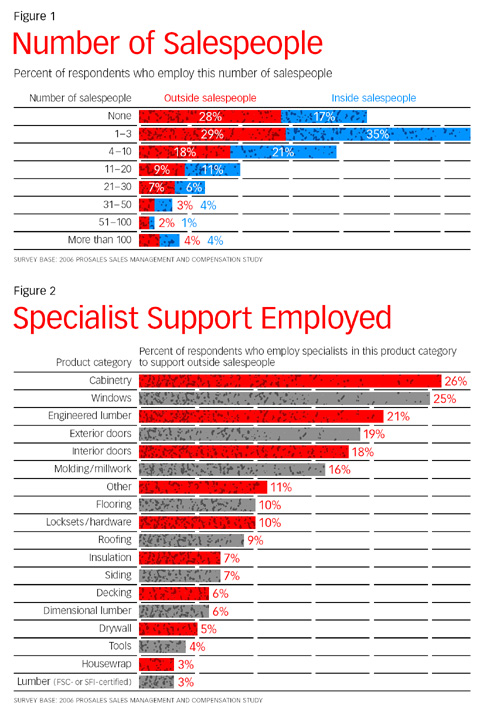Raymond’s Martin adds that retaining salespeople often boils down to conveying and reinforcing their importance to the company on a consistent basis. “We don’t let them run amok or feel they are being left alone. I listen to everything they say and try to include them in our decision-making.”
Emphasis on Training The survey’s respondents see three major challenges to their businesses’ prosperity ahead: pressure on their margins, competition from big box retailers, and more builders buying direct from manufacturers (see Figure 4, page 70). Yet, in another reflection of the dichotomy between the smaller dealers in the survey and the larger dealers interviewed here, many of the LBM suppliers who were interviewed say their greatest concern is builder consolidation.
If, as some housing industry watchers predict, consolidation among builders accelerates as buyer demand softens, then dealers will have their work cut out for them to hold on to their clients’ purchases. That might explain why many of the dealers interviewed are pushing their sellers harder to concentrate on two areas: customer relations and prospecting for new accounts. “The majority of our salespeople are driven businesspeople who are always prospecting through cold calls, targeted accounts, and referrals,” says Kelly of TW Perry. Raymond Building Supply goes so far as to select which accounts it wants its sellers to go after. “We send them out on recon missions,” says Martin.
But are dealers providing their salespeople with the training and tools they need to drum up business in what could become a much tougher selling environment? Nearly three-quarters of those polled say they have conducted some sales training within the previous 12 months, the majority of which was conducted in-house (see Figure 5, page 72). TW Perry recently started a blueprint estimating program for its sales team, and this summer was in the process of implementing a customer relationship management program, a computer-based training regimen that all of its sellers must go through and which Kelly says provides salespeople with more detailed information about their clients’ needs that will allow the sellers to manage accounts more intimately.
The level of training that dealers provide new hires also appears to be evolving from what had been a cursory exercise that entailed a tagalong period with seasoned veterans to a more comprehensive game plan that exposes recruits to more of the company’s operations. McCray Lumber requires new hires to spend anywhere from six to 12 months working with framing crews and its inside sales team, says Haynes. Fresh sellers at Alpine must first serve as backups to the inside support team, and by the time they are out on their own “they have a good working knowledge of delivery, purchasing, accounts receivable, bundling loads, dispatch, and our products,” says Taha, who adds that several of Alpine’s sellers have enrolled in floor-design courses.
Each of Raymond Building Supply’s new hires is required to work in the company’s divisions (including millwork, hardware, and installation) in order to understand products and their applications. That training, says Martin, usually takes six months, and by the time they get thrown into the water to swim on their own, these new sellers have also received another three to four months of education by working side-by-side with inside coordinators and handling house accounts.
“Knowledge is power,” Martin says. —John Caulfield is a contributing editor for PROSALES.
Support Tools When it comes to providing salespeople with incentives and tools to do their jobs better, offerings still vary widely. Dinner/entertainment vouchers, sporting event tickets, and trips are the most popular incentives the respondents offer. On the technology side, salespeople still appear to be somewhat disconnected in the field, with less than 20 percent of respondents indicating they equip outside salespeople with handheld computers or remote e-mail devices.
About the Survey The findings of the PROSALES Sales Management and Compensation Study are based on e-mail responses from 268 executives and managers who subscribe to PROSALES. Questionnaires were e-mailed to subscribers in May 2006. The online survey was hosted by Specpan, an Indianapolis-based market research company owned by The Farnsworth Group. Specpan compiled the data and prepared a report on the survey results. ( Note: Dealers interviewed for this story were not necessarily participants in the survey itself.)

